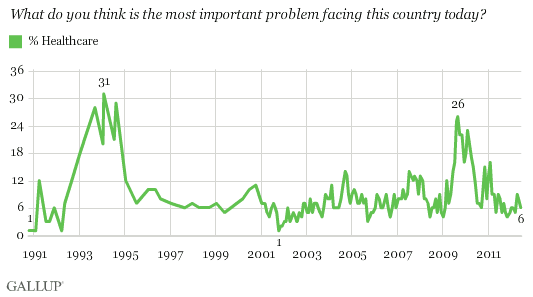PRINCETON, NJ -- Although the Affordable Care Act of 2010 has dominated the news recently, with coverage exploding Thursday as the Supreme Court ruled to uphold the law, few Americans so far in 2012 mention healthcare when asked to identify the most important problem facing the country. Six percent say healthcare is the top problem in June, behind mentions of the economy, jobs, the deficit, and problems in government.

The current 6% who mention healthcare is slightly below the average of 8% of Americans who since January 2001 have mentioned healthcare as the nation's top problem. Over the first six months of this year, an average 7% mentioned healthcare as the top problem.
The top-of-mind salience of healthcare usually rises significantly when it is a focus of political and legislative debate.
Between September 1993 and August 1994, the percentage of Americans mentioning healthcare as the nation's top problem increased significantly, and included Gallup's historical high of 31% in January 1994. These months encompassed the period when President Bill Clinton and first lady Hillary Clinton were developing, promoting, and attempting to pass a new healthcare reform plan.
Similarly, as the debate over the healthcare plan pushed by President Obama began to dominate the news from the summer of 2009 through its ultimate passage in March 2010, the "healthcare" percentage in the "most important problem" question rose again, reaching 26% in late August and early September 2009. After the bill passed, mentions of healthcare generally declined, and have not risen above single digits since February 2011.
Although healthcare may not have been top-of-mind so far this year, it has remained a latent concern for Americans.
Gallup in May gave Americans a list of 10 economic issues and asked them to rate the importance of each. Americans put healthcare at the top of the list. Forty percent rated "the cost of healthcare" as extremely important, with another 44% saying it was very important, putting it just ahead of unemployment and the federal budget deficit.
Gallup separately asked Americans in March how much they personally worried about 15 problems facing the country. "The availability and affordability of healthcare" tied "federal spending and the budget deficit" for third on the list, with 60% of Americans saying they worried about it "a great deal." Only gas prices, which at that time were on the way up, and the economy received higher concern.
Bottom Line
Healthcare may be an important issue when Americans are reminded of it in survey questions, but relatively few routinely mention it as the most important problem facing the U.S., except when it is the subject of intense legislative debate. Now that the Supreme Court has ruled that the 2010 Affordable Care Act is constitutional, the healthcare issue may become more of a front-and-center focus of news coverage and the presidential election campaigns, and healthcare may thus rise again in Americans' priorities as the most important problem facing the country.
Survey Methods
Results for this Gallup poll are based on telephone interviews conducted June 7-10, 2012, with a random sample of 1,004 adults, aged 18 and older, living in all 50 U.S. states and the District of Columbia.
For results based on the total sample of national adults, one can say with 95% confidence that the maximum margin of sampling error is ±4 percentage points.
Interviews are conducted with respondents on landline telephones and cellular phones, with interviews conducted in Spanish for respondents who are primarily Spanish-speaking. Each sample includes a minimum quota of 400 cell phone respondents and 600 landline respondents per 1,000 national adults, with additional minimum quotas among landline respondents by region. Landline telephone numbers are chosen at random among listed telephone numbers. Cell phone numbers are selected using random-digit-dial methods. Landline respondents are chosen at random within each household on the basis of which member had the most recent birthday.
Samples are weighted by gender, age, race, Hispanic ethnicity, education, region, adults in the household, and phone status (cell phone only/landline only/both, cell phone mostly, and having an unlisted landline number). Demographic weighting targets are based on the March 2011 Current Population Survey figures for the aged 18 and older non-institutionalized population living in U.S. telephone households. All reported margins of sampling error include the computed design effects for weighting and sample design.
In addition to sampling error, question wording and practical difficulties in conducting surveys can introduce error or bias into the findings of public opinion polls.
For more details on Gallup's polling methodology, visit www.gallup.com.
